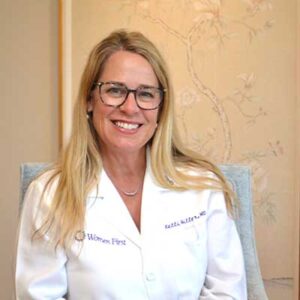The certified experts at Women First Louisville are empowering females to thrive during menopause and beyond.
LOUISVILLE Previously, menopause was with politics and religion as a topic not fit for polite discussion. Even though every woman who reached midlife will contend with menopause, it remained a taboo topic. Fortunately, with the rise of online information and emergence of organizations like The Menopause Society, women are reaching new levels of awareness and access.
The Menopause Society, formerly known as The North American Menopause Society, was founded in 1989. It provides resources for healthcare providers and the public offering certification to individuals, identifying them as trusted experts in the menopause space. Kelli Miller, MD, OB/GYN, and Audrey Fenwick, PA-C, of Women First of Louisville are both Menopause Society Certified Practitioners (MSCP). They are using their expertise to dispel the myths surrounding menopause and to provide leading-edge education and the latest treatment options.
Miller completed her undergraduate education in biology and chemistry, and then her medical degree and training in obstetrics and gynecology at the University of Louisville. In 2002, she joined Women First. Miller’s primary passions are menopause medicine, hormonal wellness, and pelvic floor disorders including incontinence and prolapse.
Filling a Gap in Women’s Care
Miller saw menopause care as an unmet need in the community of women she served. “In our medical and residency training, most training is about pregnancy, puberty, contraception. We get very little education in menopause care, despite the fact that we spend 40% of our lives in the menopause age range. I wanted to get more education to better inform my patients,” she says.
Fenwick shared this sentiment: “Menopause and sexual health are two areas in which women were not being heard, and solutions were not being presented and I wanted to go into that field.” To become part of the solution, Fenwick entered the Master of Science in Physician Assistant Practice at Rosalind Franklin University of Medicine and Science in North Chicago, Illinois. She worked at both the Northwestern Medicine Center for Sexual Medicine and Menopause and the Center for Complex Gynecology before entering her current position with Women First, where she focuses on menopause management and sexual health.
Three Common Menopause Misconceptions
MYTH 1 Menopause just means hot flashes
Though hot flashes and night sweats are the most publicized symptoms, there are a host of other complaints that accompany menopause, including sleep disturbance, brain fog, fatigue, joint pain, weight gain, lower libido, vaginal dryness, heightened anxiety, and worsening depression. According to Miller, “Loss of estrogen affects pretty much every body organ system. And in 15% of women, the symptoms persist for all their life and not just a year.”
MYTH 2 Menopausal women must simply suffer in silence.
“For years and years—generations and generations—menopause went untreated or undertreated. Women stopped asking for help,” says Fenwick. Many women, and some primary providers, see the symptoms of menopause as a normal part of aging to be endured without complaint. According to Fenwick, “Women tell themselves, ‘I can just muscle through it and take what’s thrown at me.’ But we know that hot flashes and night sweats, alone, raise our cardiovascular risk. This is something that needs to be treated. Quality of life doesn’t have to be compromised.”
Miller adds, “As I entered perimenopause, and now menopause, I didn’t feel there was a lot of information out there. We were told to just suffer in silence through the changes. There was not a lot of awareness about treatment; so I wanted to educate myself on the options and the science and data.”
MYTH 3 Hormone replacement therapy is dangerous
This myth started with a 2002 study, referred to as the Women’s Health Initiative. Miller states, “A large study was published in 2002 that did a great disservice to women, because it showed an increased risk of breast cancer, heart attacks, blood clots, and strokes in women on hormone therapy. This caused a lot of media attention, outrage, and fear, which caused many women to stop taking hormone therapy and prescribers to stop prescribing it. It’s taken 20 years to get follow-up data from that study to refute those findings.”
The 2002 study utilized patients approximately 65 years old, which is much older than the typical menopausal age, and administered conjugated equine estrogens and a synthetic progestin (Provera), though both are less commonly used now, having been replaced by bioidentical hormone therapy, often using transdermal rather than oral estradiol to mitigate blood clot and stroke risk.
In their 2017 Hormone Therapy Position Statement, based on recommendations of an advisory panel of clinicians and researchers, The Menopause Society reported that, for vasomotor symptoms (VMS) and the genitourinary syndrome of menopause, hormone therapy is still the most effective treatment.1 In addition, there are actual health benefits
for women who adhere to hormone therapy. Fenwick points out, “It can reduce colon cancer risk, dementia risk, heart disease, and osteoporosis. Estrogen also reduces our breast cancer risk.”
Modern Management of Menopause
Miller, Fenwick, and the other practitioners at Women First—a distinctly all-female practice—are committed to addressing these misconceptions and providing the most comprehensive and innovative obstetric, and gynecology care to females in every stage of life. This often starts with an in-depth conversation. Fenwick states, “When they first come in for their appointment, I try to learn about them, personally and professionally. Much of my time is really spent getting to know the patient and, specifically, learning about their goals for the appointment.”
These discussions should ideally start well before the onset of menopause. According to Miller,
“The average age of menopause is 51, but I like to start in the 40s, or even 30s, discussing hormone health and the decline of our ovarian hormones, how we feel with that decline, and talking through the bodily changes, physical and emotional and mental, that go along with that decline.”
Fenwick adds, “It’s very important to me to create an environment where shared decision-making is key and we talk about all the treatment options that are available. I try to be very fair and balanced. I lay out all the options that have been FDA-approved and things that may be used off-label. We discuss the risks and benefits of each of them. Then, the patient is able to make an informed decision on their treatment.”
Increased Awareness leads to Increased Quality of Life
In the past years, thanks to dedicated menopause experts, accurate articles, and the media no longer avoiding the topic, menopause has become much more widely discussed, leading to the sharing of invaluable information with the ultimate goal of women living their best lives well beyond fifty.
States Fenwick, “I went into this to make women feel heard, to educate women, and really maximize quality and quantity of life. Two thirds of our lives are spent in perimenopause and menopause, and I really want to help people to maximize that quality.”
In closing, Miller echoes, “I’m here to educate women that they’re not alone. They should communicate and find a provider that is supportive. They can get in the best shape of their life—body, mind, and spirit—by embracing the transition…because it is a fantastic transition. The 50s are probably the best time of my life, honestly.”





